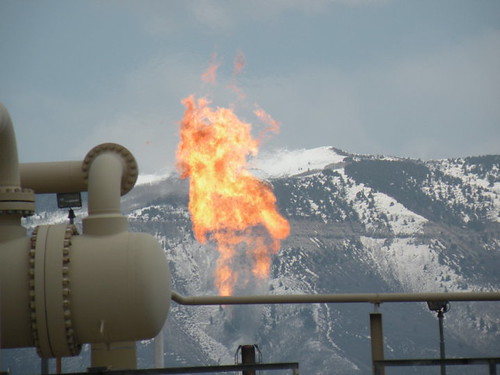17日,全球主要石油公司的執行長,首次與產油國政府官員發布聯合聲明,同意將於2030年起,生產石油時不再例行性燃燒天然氣。
聯合國推天然氣零燃除 9國家10企業支持
此「2030年零例行性燃燒天然氣倡議」,由聯合國秘書長潘基文和世界銀行集團總裁金墉宣布啟動,已有9個國家、10間石油公司和6個發展機構支持,包括荷蘭皇家殼牌董事長Jorma Ollila、挪威國家石油公司CEO Eldar Saetre、挪威外交大臣Børge Brende、加蓬石油部長Etienne Dieudonne Ngoubou、其他政府高層官員和企業管理人員,以及國際開發銀行代表。
這些企業的天然氣燃除(gas flaring)量,超過全球總量的40%。
產油副產品 天然氣就這樣白白燒光
全世界的天然氣燃燒活動有害環境,也浪費珍貴的能源資源。每年,全世界數千油田共有1400億立方公尺石油製程產生的天然氣被這樣燒掉,排放超過3億噸的二氧化碳進入大氣,等於7.7千萬輛汽車的排放量。
這些天然氣有更好的利用方式,如提供數百萬人電力。
如果這些天然氣能被用來發電,發電量比今日整個非洲大陸的消耗量還大(7500億千瓦小時)。但是由於各種技術、法規限制和經濟誘因不足,或是優先順序還不夠高,目前這些天然氣還是被白白浪費掉。
減少浪費資源 滿足能源缺口
支持倡議的政府、企業和開發機構皆同意,從資源管理和環境觀點來看,天然氣燃除皆缺乏永續性,同意在2030年前合作儘快終結例行天然氣燃燒。
俄羅斯能源部次長Kirill Molodtsov表示:「俄羅斯聯邦能源部贊同世界銀行對於石油天然氣燃燒的考量。除了浪費天然資源外,燃燒天然氣還會釋出有害物質,改變大氣的組成。」
殼牌石油董事長Jorma Ollila也表示同意:「停止例行天然氣燃燒能有效減少二氧化碳排放,同時有助滿足全球能源需求。」
強化技術 促進利用石油製程天然氣
金墉指出,世界銀行身為全球天然氣燃燒減量合作計畫的創始成員,已經在這個議題上耕耘15年。世界銀行和計畫成員以及聯合國人人享有永續能源倡議(United Nations Sustainable Energy for All)成員合作,排除技術和法規限制,促進石油製程天然氣的利用。
尚未加入倡議的石油公司和政府也正在全面審查自家的天然氣燃燒情況。未來幾個月預計將陸續有新成員加入。
For the first time, chief executives of major oil companies joined today with senior government officials from oil-producing countries in an agreement to end the practice of routine gas flaring at oil production sites by 2030 at the latest.
The Zero Routine Flaring by 2030 global initiative – already endorsed by nine countries, 10 oil companies and six development institutions – was launched today by United Nations Secretary-General Ban Ki-moon and World Bank Group President Jim Yong Kim.
They were joined by Royal Dutch Shell Chairman Jorma Ollila; Statoil CEO Eldar Saetre; Norwegian Foreign Minister Børge Brende; Gabonese Minister of Petroleum Etienne Dieudonne Ngoubou; other senior government and corporate officials, and representatives of international development banks.
The endorsers collectively represent more than 40 percent of global gas flaring.
Flaring of natural gas around the world is harming the environment and wasting a precious source of energy, which could instead be used in productive ways like providing millions of people with electricity.
Every year, around 140 billion cubic meters of natural gas produced together with oil is wastefully burned or “flared” at thousands of oil fields around the world. This results in more than 300 million tons of CO2 being emitted to the atmosphere – equivalent to emissions from approximately 77 million cars.
If this amount of associated gas were used for power generation, it could provide more electricity (750bn kWh) than the entire African continent is consuming today. But currently, the gas is flared for a variety of technical, regulatory, and economic reasons, or because its use is not given high priority.
By endorsing the initiative, governments, oil companies and development institutions recognize that routine gas flaring is unsustainable from a resource management and environmental perspective and agree to cooperate to eliminate ongoing routine flaring as soon as possible and no later than 2030.
They will publicly report their flaring and progress towards the target on an annual basis.
They agreed that routine flaring will not take place in new oil fields developments. Governments will provide an operating environment conducive to investments and to the development of functioning energy markets.
Russia’s Deputy Minister of Energy Kirill Molodtsov said, “The Ministry of Energy of the Russian Federation shares the World Bank concerns about associated petroleum gas flaring. In addition to being a waste of a finite natural resource, flaring of produced gas releases harmful substances into the atmosphere, which change the composition of the atmosphere every year.”
Royal Dutch Shell Chairman Jorma Ollila agrees. “Ending routine flaring is a practical way to lower CO2 emissions while meeting the world’s energy needs,” he said.
Kim said the World Bank has been active on this issue for 15 years, as a founding member of the Global Gas Flaring Reduction Partnership. The Bank works with its partners in GGFR and the United Nations Sustainable Energy for All initiative to increase the use of associated gas by helping remove the technical and regulatory barriers to flaring reduction.
Oil companies and governments that have yet to endorse the initiative are currently undertaking comprehensive reviews of their gas flaring. Many are expected to join the initiative in the coming months.
※ 全文及圖片詳見:ENS







